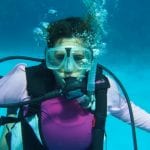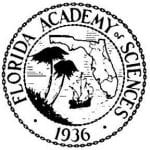Science Cafés featuring UCF scientists
As part of our celebrations for the UCF 50th Anniversary the College of Sciences will be hosting several Science Cafés to showcase our Pegasus Professors and discuss Science Beyond UCF with the Central Florida community.
Admission is free, and you need no reservation—just come ready to listen and contribute. Each speaker will begin their presentation at 7 p.m. so please arrive around 6 p.m. if you plan on having dinner at Taste. All Science Cafés will be held at Taste Restaurant, which is located at 717 W. Smith Street in College Park and pictured below. Get directions to the restaurant and view their menu by visiting their website http://www.tastecp.com/.
Please join us! Tentatively, here are the speakers that have committed to discuss their research and other initiatives:
Dr. Linda Walters, Biology, October 3, 2012, 7 p.m.
Linda Walters, PhD, will provide vignettes of some of the ways humans have altered marine systems, including ocean acidification, coral bleaching, fisheries, invasive species, and habitat destruction. She will also discuss community-based education and outreach campaigns that her lab at UCF has successfully started.
Dr. Walters’ is currently a Pegasus Professor in the UCF Biology Department, Director of UCF’s Fellers House Field Research Station in Canaveral National Seashore, and Interim Director of the UCF Women’s Research Center. She has been a faculty member at UCF for 15 years with a Ph.D. from Univeristy of South Carolina and post-doctoral research experience in Hawaii, Quebec and Cochin, India. Her research program focuses on many of the diverse ways humans impact the marine environment. She is interested in both pure ecology questions and goal-based conservation issues for a wide range of marine and estuarine habitats in the Caribbean and the southeastern US, especially the Indian River Lagoon system and the Florida Keys.
Dr. Kevin Belfield, Chemistry, November 7, 2012, 7 p.m. 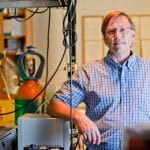
Cancer: Seeing the details before it’s too late
Dr. Belfield’s research interests are in multiphoton absorbing materials, supramolecular materials, two-photon photochemistry, two-photon 3D optical data storage, multiphoton fluorescent probes and multiphoton bioimaging for early tumor detection and image guided surgery, photodynamic therapy agents, nanostructured functional organic and polymeric materials, and photochromic materials.
Dr. Jim Wright, Sociology, December 5, 2012, 7 p.m. 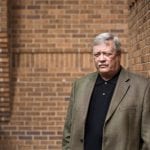
Down and Out in Theme Park Nation
A place like Orlando, Florida is not transformed from swampland to sprawling metropolis through Peter Pan-like flights of fancy, but through theme park expansions requiring developmental schemes that are tough minded and often worsen relationships between the wealthy and the poor.
Dr. Wright will be summarizing the main themes and points of his new book, Poor and Homeless in the Sunshine State: Down and Out in Theme Park Nation. The homeless arrive with their own hopes and illusions, which are soon shattered.
James D. Wright is an author, educator, and the Provost’s Distinguished Research Professor in the Department of Sociology at UCF.
Dr. Humberto Campins, Physics, January 9, 2013, 7 p.m. 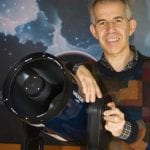
Did Asteroids Bring Water and Organic Molecules to Earth?
The recent discoveries of water ice and organic molecules on two
asteroids, 24 Themis and 65 Cybele, are transforming current views of
the delivery of water and organic molecules to Earth by asteroids, and
the origin and evolution of life on Earth. These discoveries also
have important implications for the three current asteroid sample
return missions: NASA’s OSIRIS-REx mission, the European Space
Agency’s Marco Polo-R mission and the Japanese Space Agency’s
Hayabusa-2 mission.
In August 2002, Dr. Campins joined the UCF faculty as Provost Research Professor of Physics and Astronomy and head of the Planetary and Space Science Group. Dr. Campins. research area is astronomy. He studies comets, asteroids and other small bodies in the solar system using a variety of ground based, airborne and space based telescopes. This research is funded by NASA and by the National Science Foundation.
Dr. Eduardo Salas, Psychology, February 6, 2013, 7 p.m.
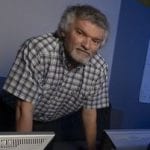 The Science of teamwork: what effective teams do, think and feel
The Science of teamwork: what effective teams do, think and feel
Teamwork has become a way of life in many industries, agencies and organizations. But, what do we know about teamwork, team leaders and team effectiveness after decades of research? Professor Salas will highlight what we know about the science and practice of teamwork and team leadership. The talk will provide HR executives, managers and practitioners with valuable practical insights about what contributes to team effectiveness in organizations.
Eduardo Salas is University Trustee Chair and Pegasus Professor of Psychology at the University of Central Florida (UCF). He also holds an appointment as Program Director for Human Systems Integration Research Department at UCF’s Institute for Simulation & Training. Previously, he was a Senior Research Psychologist and Head of the Training Technology Development Branch of NAVAIR-Orlando for 15 years.
Dr. Llew Ehrhart, Biology, March 6, 2013, 7 p.m. 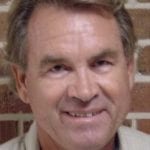
The UCF Marine Turtle Research Group’s Role in the Creation of a New National Wildlife Refuge on Florida’s East Coast
Emeritus Professor Ehrhart is a vertebrate zoologist whose research program is focused on reproduction, population biology, ecologic geography, and conservation biology of marine turtles. His most recent research interest involves characterization of juvenile and subadult populations in coastal lagoons and over near-shore reefs, as well as long-term studies of nesting beach productivity.
Dr. Talat Rahman, Physics, April 3, 2013, 7 p.m.
Dr. Talat Rahman is the UCF Physics Chair and a a UCF Pegasus Professor. Only a few years ago, the science and engineering of manipulating matter at the atomic and molecular level seemed to be a promise of enormous changes to come in a few decades. Instead, the results of nanoscience quietly sneaked into our everyday lives yesterday. Dr. Rahman will talk about nanoscience, its brief history, and its current state. Rahman’s research interests focus in the development of a theoretical and computational framework for understanding phenomena such as chemisorption, diffusion, reaction, and ordering that control novel properties of materials at the nanoscale. Her work also engages multiscale modeling for the simulation of epitaxial growth and surface morphological evolution. For the past 12 years she has been organizing a workshop in Pakistan on Nanoscience and Condensed Matter Physics at the annual International Nathiagali Summer College which was started by Nobel Laureate Professor Abdus Salam. She is known for her ability to collaborate with experimentalists and theorists alike, and does so with some of the leading groups worldwide.
Drs. Arlen and Diane Chase, Anthropology, May 1, 2013, 7 p.m. 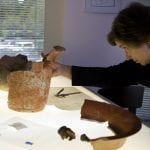
After the Maya Apocalypse: Caracol, Archaeology, and Time
When Arlen and Diane Chase first traveled to Caracol in 1983, the city was completely covered by Belizean jungle. In more than 25 years of research, the Chases, husband-and-wife anthropologists at the University of Central Florida, have pieced together what Diane describes as “a much more complete story about Caracol,” one of the largest Maya cities. Through stable isotope analysis they can tell you what Caracol’s residents ate — which residents had a high-maize, high-protein diet, and which didn’t — and they can also tell you how the relatively uniform distribution of pottery suggests a strong sense of shared identity across social classes.
The Cafe Scientifiques are sponsored by the Florida Academy of Sciences. The Academy partners with the College of Sciences in increasing the public’s understanding of science though such programs as the Ask-A-Scientist program, which is run in conjunction with the Orlando Science Center. The Science Cafe movement in the US was launched in conjunction with Sigma Xi. For more information about the Florida Academy of Sciences, please visit their website by clicking here.

